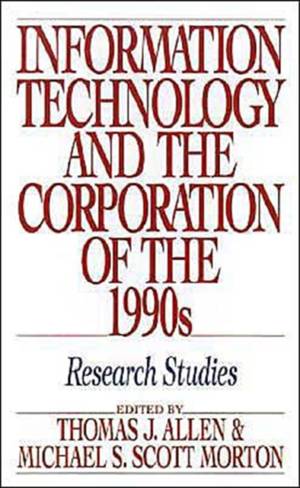
Je cadeautjes zeker op tijd in huis hebben voor de feestdagen? Kom langs in onze winkels en vind het perfecte geschenk!
- Afhalen na 1 uur in een winkel met voorraad
- Gratis thuislevering in België vanaf € 30
- Ruim aanbod met 7 miljoen producten
Je cadeautjes zeker op tijd in huis hebben voor de feestdagen? Kom langs in onze winkels en vind het perfecte geschenk!
- Afhalen na 1 uur in een winkel met voorraad
- Gratis thuislevering in België vanaf € 30
- Ruim aanbod met 7 miljoen producten
Zoeken
Omschrijving
One of the most pathbreaking and influential business books of the 1990s is The Corporation of the 1990s by Michael Scott Morton. Its expert view of how information technology would influence organizations and their ability to survive and prosper in the 1990s has become the benchmark of thinking about information technology. Now, in a supporting companion volume, Information Technology and the Corporation of the 1990s makes available the research on which The Corporation of the 1990s was based. The research was conducted at the Sloan School of Management at MIT by the Management in the 1990s program. The program was funded by a group of 12 industrial and government sponsors from the United States and Britain which included American Express, Digital Equipment Corporation, Eastman Kodak, British Petroleum, MCI Communications, General Motors, U.S. Army, ICL Ltd., Internal Revenue Service, Ernst & Young, BellSouth, and CIGNA Corporation.
Information Technology and the Corporation of the 1990s aims to disseminate ideas on how organizations can manage the impact of information technology, and also to raise issues and stimulate further thought by both academics and professionals. The book is divided into three sections which cover the information technology revolution, strategic options, and organization and management responses. It incorporates the work of many important scholars including Charles Jonscher, Michael J. Piore, Thomas W. Malone. JoAnne Yates, Robert I. Benjamin, Gary W. Loveman, Eric von Hippel, Edgar H. Schein, Stanley M. Besen, Garth Saloner, N. Venkatraman, Akbar Zaheer, John C. Henderson, Jay C. Cooprider, Kevin Crowston, Jeongsuk Koh, Gordon Walker, Laura Poppo, John S. Carroll, Constance Perin, Brian T. Pentland, John Chalykoff, Lotte Bailyn, D. Eleanor Westney, Sumantra Ghoshal, John D.C. Little, Thomas J. Allen, Oscar Hauptman, Lisa M. Lynch, Paul Osterman, Thomas A. Kochan, and John Paul MacDuffie.
Information Technology and the Corporation of the 1990s aims to disseminate ideas on how organizations can manage the impact of information technology, and also to raise issues and stimulate further thought by both academics and professionals. The book is divided into three sections which cover the information technology revolution, strategic options, and organization and management responses. It incorporates the work of many important scholars including Charles Jonscher, Michael J. Piore, Thomas W. Malone. JoAnne Yates, Robert I. Benjamin, Gary W. Loveman, Eric von Hippel, Edgar H. Schein, Stanley M. Besen, Garth Saloner, N. Venkatraman, Akbar Zaheer, John C. Henderson, Jay C. Cooprider, Kevin Crowston, Jeongsuk Koh, Gordon Walker, Laura Poppo, John S. Carroll, Constance Perin, Brian T. Pentland, John Chalykoff, Lotte Bailyn, D. Eleanor Westney, Sumantra Ghoshal, John D.C. Little, Thomas J. Allen, Oscar Hauptman, Lisa M. Lynch, Paul Osterman, Thomas A. Kochan, and John Paul MacDuffie.
Specificaties
Betrokkenen
- Auteur(s):
- Uitgeverij:
Inhoud
- Aantal bladzijden:
- 544
- Taal:
- Engels
Eigenschappen
- Productcode (EAN):
- 9780195068061
- Verschijningsdatum:
- 6/01/1994
- Uitvoering:
- Hardcover
- Formaat:
- Genaaid
- Afmetingen:
- 162 mm x 244 mm
- Gewicht:
- 884 g

Alleen bij Standaard Boekhandel
+ 966 punten op je klantenkaart van Standaard Boekhandel
Beoordelingen
We publiceren alleen reviews die voldoen aan de voorwaarden voor reviews. Bekijk onze voorwaarden voor reviews.









